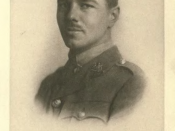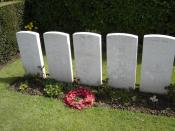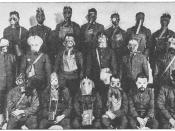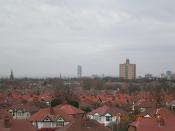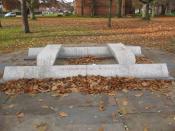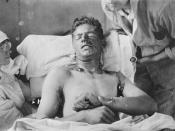In the poem, ?Dulce et Decorum Est?, Wilfred Owen writes about his own experience during his time as a soldier at the front during the First World War. Owen skillfully creates a clear statement of his disgust at the lies told to young men by the British government in order to encourage them to join the army during World War I. In his poem, Owen describes one particular incident which took place before his eyes, and which illustrates the horror of war. Owen and his squad of exhausted soldiers are painfully making their way back to base after a tormenting time at the battle front when a gas shell is fired, and as a result of this, the squad is fatally gassed. Owen has arranged the poem in three sections, each dealing with a different stage of this experience. He makes use of a simple, regular rhyme scheme, which makes the poem sound almost like a child's poem or nursery rhyme.
This technique serves to emphasize the solemn and serious content, and the irony of ?the old lie,? of the title.
In stanza one, Owen describes the soldiers as they set off towards the army base camp after a spell at the battle front. His use of similes such as ?Bent double, like old beggars,? and ?coughing like hags,? help to depict the soldiers? poor health and depressed state of mind. Owen makes one picture the soldiers as ill, disturbed and utterly exhausted. He shows that this is not the government-projected stereotype of a soldier, in gleaming boots and crisp new uniform, but is the true illustration of the poor mental and physical state of the soldiers. By telling the reader that many of the soldiers are barefoot, Owen gives one an idea of how awful the soldiers? journey already is; it then gets even worse. Owen tells the reader that the soldiers, although they must have been trained, still do not notice the deadly mustard gas shells being fired at them from behind, such is the extent of their exhaustion.
In the second stanza, the pace of the narrative is increased. Owen describes the flurry of activity which takes place when it dawns on the squad that they have the hazard of gas to deal with. He begins by writing ?gas, GAS!? which instantly grabs the reader?s attention, and by writing it first in lower case and then again in capitals, he gives the reader an impression of the rising alarm in the solders. Owen uses the expression ?an ecstasy of fumbling,? to describe the soldiers trying desperately to get out and fit their gas masks, the word ?ecstasy? being used to give us the impression of the complete, all consuming panic which the soldiers feel when they notice the gas shells. This is effective because it is a complete contrast to the image of the soldiers before the shell, at first they were trudging on, ?drunk with fatigue,? but are suddenly forced into an ?ecstasy of fumbling,? by the falling of the gas shell. Just when the situation seems unbearable, it gets even worse. Owen makes sure his readers are aware of the horror of the situation. The description of the gas masks as ?clumsy helmets? tells one that the equipment given to the soldiers is heavy and substandard. Owen then describes one of the soldiers who is not quick enough in fitting his mask, and is now yelling out in pain and stumbling around. Owen describes the man ? as under a green sea.? His words make one aware of the poor lenses fitted to the gas masks. The dying man is said to be ?drowning.? By the use of this word the reader is reminded that the mustard gas from the shells corrodes the lungs, so not only is he being deprived of air, he is drowning in his own bodily fluids.
Stanza three goes on to describe how Owen is haunted by the ghastly picture of the poor soldier who is ?flung? in to a wagon and trundled back to base. Owen and his comrades know that there is no hope for their friend?s survival, but despite the fact that they would be fleeing the hazard of the gas, their sense of humanity and mutual concern will not allow them to abandon their comrade, so they load his body into a lorry and walk along, unable to stop his suffering. The vocabulary and imagery used by Owen in this stanza is deliberately shocking to force his readers to react. For example, the simile ?obscene as cancer? is effective, because everybody fears cancer; it is a horrible way to die, much as war is in Owen?s opinion. Owen compares the sickening scene with the equivalent horror of ?vile incurable sores on innocent tongues,? to comment on the falsehoods which the naive young men were fed by the government in order to glorify the role of a soldier. Owen?s use of the words ?my friend,? toward the end of the last stanza suggests that Owen is directing this poem at the government which was promoting war; it has an ironical, and extremely threatening tone. The poem ends with the Latin quotation ?Dulce et Decorum est pro patria mori,? which means: ?It is sweet and fitting to die for one?s own country.? This is particularly effective after such a horrific description as it makes one wonder how anyone could ever have believed it.
I enjoyed reading this poem, I liked the irony that Owen has used in the poem, and found the descriptions, though upsetting, to be very vivid and effective. The message of the poem remains significant today, and it has definitely reinforced my opinion that fighting in a war is not a privilege and the horror it inflicts on innocent soldiers is wrong.
